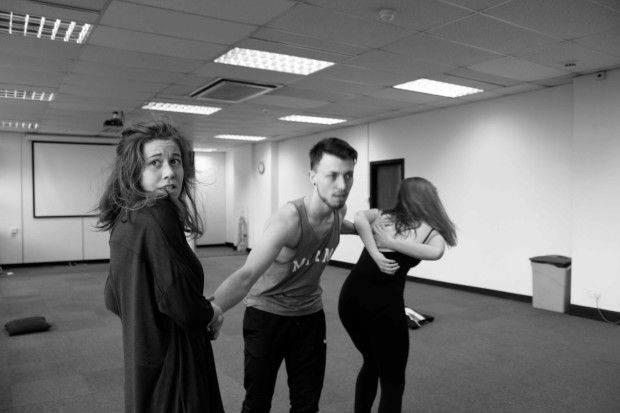You have no items in your cart. Want to get some nice things?
Go shopping
In Georg Büchner’s fragmentary, expressionistic Woyzeck, attention is traditionally focused on the eponymous protagonist. However, The Sun Shining On Her Hands – a creative reimagining by Trip the Light Theatre, an exciting company influenced by physical theatre – gives the spotlight to the much more sidelined character of Marie, who has a child with Woyzeck but is nonetheless free-spirited, passionate and promiscuous. Marie is someone who pays the ultimate price for transgressing the boundaries of what society considers “decent”. Indeed, in her article The role of Marie in Georg Büchner’s Woyzeck, critic Laura Martin argues:
Culturally determined assumptions about sexuality, love and revenge make the murder of a promiscuous woman both a necessary and an acceptable outcome of the play.
On top of this, she notes:
Despite the vigour with which Büchner has portrayed her, Marie effectively disappears from the text, as if, once murdered, she can be safely buried forever.
As such, Woyzeck is very open to feminist readings. It’s true that many critics have overlooked the role of patriarchal social structures in shaping its characters’ behaviour. In Georg Büchner’s Woyzeck: A History of Its Criticism, David G. Richards, paraphrasing the Marxist critic Albert Meier, writes:
Both Marie and Woyzeck are forced to carry out unwanted and self-destructive acts. Their aggression is directed against each other rather than against their oppressors and the social structure.
However, such a reading of Woyzeck is incomplete. In actual fact, Marie’s rebellious nature and ultimate downfall is largely the result of the patriarchal society around her. Significantly, Trip the Light’s The Sun Shining On Her Hands sets out to redress this oversight. Critical evaluations of Marie tend to fall into two categories: either she is a marginal ornamentation or she is a lascivious whore who deserves the punishment Woyzeck doles out to her. The few exceptions are the female critics Laura Marlin (referred to above) and Kerry Dunne, who in an article of 1990, made a very important reassessment of Marie’s character, arguing that she is as much of a victim as Woyzeck. Certainly, in an interview with Female Arts, Cassiah Joski-Jethi, co-founder of Trip the Light, herself emphasised the intent of the production to “reclaim the text for her [Marie’s] story”, as “she is an incredibly misunderstood and ill-treated character.”
To add even more of a twist, three actors play the part of Marie – or, rather, each portray a different aspect of Marie’s personality. Interestingly, male actor Ash Goosey plays the maternal, protective side of Marie’s nature, looking after the baby, while Sara Jasmin Page draws out the childish, impulsive and passionate side of Marie. Anna Rachael McBride appears to bring a more ruminative, thoughtful and rational element of Marie to the fore. All three actors masterfully convey these sides of Marie through a combination of physical movement, speech, song and expression – making for a highly inventive and unorthodox production. The physical movement often feels quite heavy and powerful, almost forceful, occasionally intentionally jerky and disjointed, but equally can flow beautifully in certain moments when the different Maries interweave.
Working well alongside disjointed, jerky movements, the speech itself is very fragmentary and repetitious. This also reflects the structure of Büchner’s Woyzeck – as Benn emphasises, the very first draft had “twenty-one scenes, varying in length from a single line to four or five hundred words”. However, the great use of pauses and repetition of incomplete phrases (e.g. “Something moving. Behind. Under”), and the fact that all the action (or rather, inaction) of The Sun Shining On Her Hands takes place in a single room while Marie is waiting for Woyzeck, also recalls Beckett. Indeed, Joski-Jethi herself has described the piece as “a bit Waiting For Godot-esque”. The futility of Marie’s endless waiting for Woyzeck adds a poignant element to the production, as the audience – along with all three facets of Marie’s personality – come to the realisation that he will not arrive.
The Sun Shining On Her Hands offers a very timely feminist interpretation of the character of Marie from Woyzeck, while also being an experimental and engaging production in its own right. The combination of fragmentary songs and words – as well as forceful but sometimes gentle, flowing movements – contributes to the intentionally disorientating experience of watching the production. This is no bad thing; in fact, the swirling confusion and lack of traditional, linear narrative positively recalls the work of Beckett – while also reflecting the fact that, as John Fuegi so eloquently put it:
The world Büchner depicts…in Woyzeck… is one stripped completely bare of traditional notions of heroism, morality, propriety and decorum.
Ultimately, the bleakness of both Woyzeck and The Sun Shining On Her Hands is most powerfully summarised in a line of Marie’s: “Everything goes to hell anyhow, man and woman alike.”
The Sun Shining On Her Hands is at the Bread and Roses Theatre until December 12. Tickets are £12 (£10 concessions). For more information, click here.

About Ana Malinovic
Ana graduated from Warwick University with a BA in English and American Literature in 2010. Her dissertation was centred on dystopian elements in the fiction of Kafka. She enjoys uncovering innovative works of fiction by a diverse range of authors. She also spends much of her time roaming around London's arts and culture scene overexcitedly. Check out her blog




